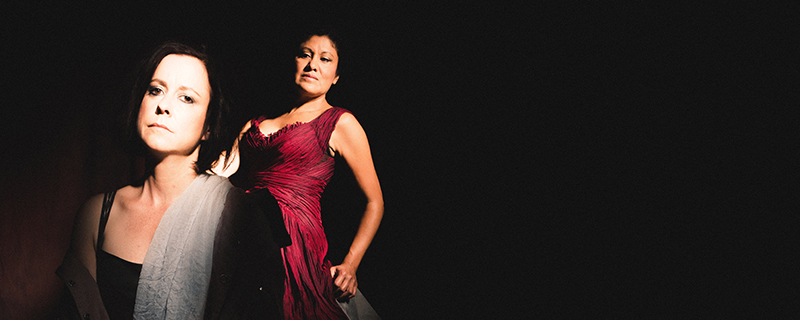Q&A: Actresses Sandra Marquez & Kate Fry

This year in Electra, we see many returning faces from Agamemnon and Iphigenia in Aulis, but we are also introduced to a few new faces that leave a lasting impression. Kate Fry (Electra) joins Sandra Marquez (Clytemnestra) in the final tragic chapter in Court Theatre’s Greek Cycle.
Sandra, this is the third round for you playing Clytemnestra. What have you learned about her character throughout this three-year process?
Sandra: I guess the thing that I have learned about Clytemnestra over these three years is that she runs the gambit of human emotions. She is so often thought of as simply a villainous angry woman, but she is more than that. She is a mother who loves her children and is never the same after Iphigenia’s death. She is a woman terribly betrayed by Agamemnon, her second husband, whom she was faithful to despite the fact that he killed her first husband and baby. She is a woman trying to find justice for her daughter. She is a woman who would have been happy to be a mother loving her children and a queen enjoying her rightful place in the palace and polis, but life dealt her a different hand.
What is it about Electra that really speaks to you in today’s world? What still makes this play relevant?
Kate: Where do I start? First of all, there is grief. Something every human being has endured (unless you’re a child who hasn’t yet experienced it or an extremely lucky adult). Grief is unavoidable and necessary, but it is also potentially toxic to the soul. I think that sometimes people suffering from grief unwittingly prolong it because it feels like the only way they can remain viscerally connected to the person they have lost. How much is this a factor in Electra’s grief? And how much of her grief is propelled by her sense of justice, making sure that all who live never forget what happened to her father? Let’s throw in survivor guilt too, just to make it a real party. When someone you love is murdered, but your own life is spared? Who feels worthy of that? Another depressingly relevant part of the play is the relentless cycle of violence. From the streets of our own city of Chicago to Aleppo, Syria, this is a cycle that seems impossible for us to escape. It’s horrible.
Sandra: In rehearsals, [Founding Artistic Director and translator] Nicholas Rudall often talks about how these plays are a reflection of Greek society trying to work out new concepts at that time, such as justice and what that has looked like, and maybe what it could or should look like. (I’m sure my paraphrasing is not doing him any justice, by the way.) Here we are a couple of thousand years later, and though we have codes and dogmas that guide us depending on one’s belief system, I think we as individuals still struggle with those same questions in our very personal circumstances.
I recently heard that after Jack Kennedy was assassinated and his brother Bobby fell into a very dark depression, Jacqueline suggested he read the Greeks. I found that incredibly moving. Having recently lost a particularly good-hearted family friend in a very senseless accident, many of the lines in Electra are terribly resonant to me right now—especially the struggle to find answers, and the rage at how events have played out. I find it a bit comforting that 2,500 years ago, humans were asking the same questions and somehow I feel less alone knowing that.
What is the most challenging thing about playing your respective roles in Electra? What is the most intriguing or exciting thing?
Kate: Something I’m grappling with is navigating the difference between justice and vengeance. There is a lot of overlap between the two, but justice seems a lot more righteous than revenge. It feels bigger in scope. Compared to justice, revenge seems mathematical: an “eye for an eye,” “you did this to me, so I will do it to you.” But if justice is achieved, there is a cosmic shift that leads to balance in the universe. Or at least it’s supposed to. As Nicholas Rudall told me, these ancient Greeks didn’t do forgiveness, the concept hadn’t been introduced to them yet. Consequently, I’m finding it difficult to see the murder of Electra’s stepfather as satisfying. To me, with my 2016 brain, it just feels like the latest phase of bloodshed. Maybe that’s the point?
Sandra: The most challenging thing about playing Clytemnestra is finding all the nuances that make her human and not just a meanie, which is how I think many people think of her. It’s important to me that she is as well rounded as I can make her.
Next year, the first installment, Iphigenia in Aulis, will head to The Getty in Los Angeles. Sandra, how does it feel to head back to the beginning of the story after finishing it up here at Court this year?
Sandra: Honestly, I am very excited to be revisiting Iphigenia next year! It will be the first time I’ve had the pleasure of reprising a show and I am eager to find out how the Clytemnestra of Agamemnon and Electra will inform the Clytemnestra of Iphigenia in Aulis. Of course, I will need to be clear about where I am in the sequence emotionally, since that first Clytemnestra has no idea what is in store for her.
Photo of Kate Fry and Sandra Marquez by Joe Mazza.